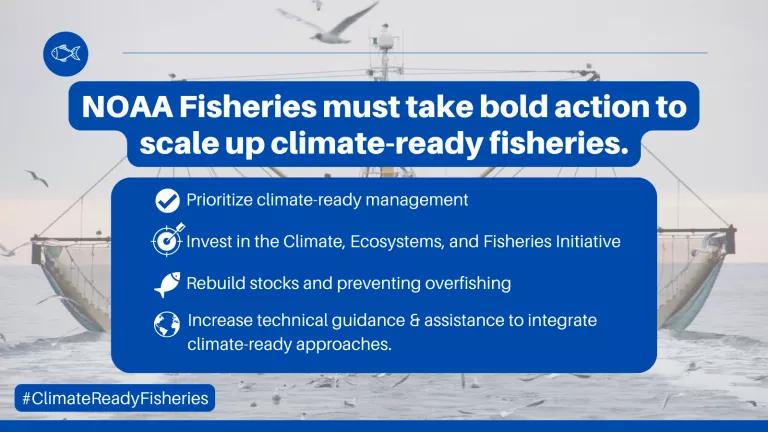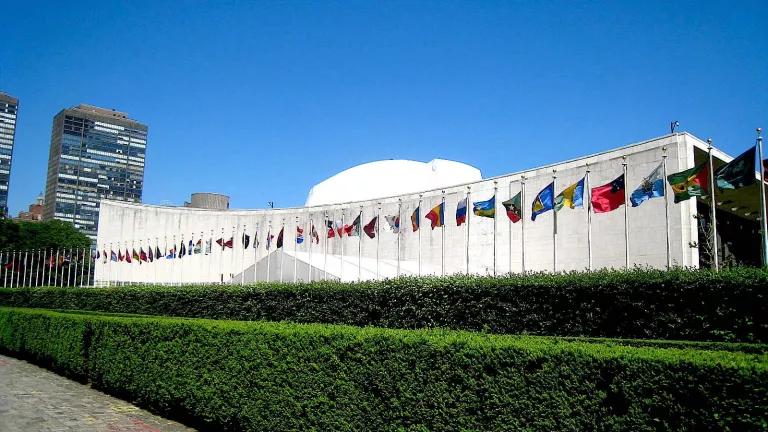
Valdez, Alaska
The House Natural Resources Committee just voted to advance key fisheries legislation that would address the changing needs of sustainable fisheries and coastal communities in light of climate change. The Sustaining America’s Fisheries for the Future Act (H.R. 4690) would reauthorize the Magnuson-Stevens Fishery Conservation and Management Act (Magnuson-Stevens Act or MSA), our federal fisheries law, which has not been reauthorized since 2006.
Despite historic successes in sustainable fisheries management, we have a lot of work to do to prevent the backsliding of fisheries conservation. Successful fisheries management in the face of climate change will require a renewed focus on sustainable catch levels and strong rebuilding measures.
The Sustaining America's Fisheries Act tackles these and other challenges with impressive depth. Here are some of the many critical updates the bill provides:
- Advances climate-ready management of our prized marine fisheries: Title I of the bill would respond to the rapid changes in our ocean by integrating climate considerations throughout the fisheries management process, addressing the management framework for shifting fish stocks, and jump-starting the production and use of climate-related science and data.
- Support coastal communities and working waterfronts: Title II of the bill would support sustainable fishing communities through a number of reforms, including a grants program for working waterfronts and updates to the fisheries disaster relief program.
- Strengthen protections for important fish habitats: Title V would strengthen tools to protect essential fish habitat from the impacts of fishing gear, as well as safeguard habitat from non-fishing activities such as sand mining, dredging, and energy exploration and development.
- Help put an end to chronic overfishing and rebuild depleted fisheries: Title V would help to ensure that rebuilding plans stay on track and put an end to chronic overfishing.
- Improve protections for other key marine species: Title V would also introduce important reforms to improve the precautionary management of forage fish, a critical food source for larger fish species and ocean wildlife, and to reduce bycatch—the unintended catch of non-target fish, marine mammals, and other wildlife.
Other important highlights of the bill include measures to modernize fisheries data collection and research (Title IV) and to increase accountability and transparency in the fishery management council process (Title III).
Today's vote, which followed an hours-long markup session by the same committee last week, represented a tremendous effort to grapple with the most pressing challenges in fisheries management. Representative Huffman, Chairman of the House Natural Resources Subcommittee on Water, Oceans, and Wildlife, who initiated and sponsored this MSA reauthorization effort, was quick to credit the team of legislators and staff who made this possible. This included Rep. Ed Case of Hawaii, an original co-sponsor of H.R. 4690, and Rep. Mary Peltola, who recently became the first Alaska Native member of Congress and has joined Reps. Huffman and Case in co-leading the legislation.
Chair Huffman’s iterative, inclusive process over the last three years has earned broad support for the bill, including from commercial fishermen, tribal members, recreational anglers and fishing guides, conservationists, and seafood businesses. Huffman described this extensive outreach, saying: “Everywhere we went, we heard that the foundation of Magnuson is sound . . . but we also heard that it can be improved and modernized, [such as by] making our fisheries ready for climate change.”
The bill has seen some technical changes and improvements since its introduction, including removing new terminology that would undermine core conservation requirements to rebuild fisheries and prevent overfishing. Consistent with his open process, Chair Huffman indicated that he would continue to work with colleagues to improve the bill.

House Natural Resources Committee Convenes
Today also marked the first Committee vote for Rep. Mary Peltola. Rep. Pelota spoke in favor of language that would seek to reduce bycatch of Alaskan salmon and add designated Alaska tribal seats to the North Pacific Council. Her remarks also emphasized needing to make sure the MSA keeps up with climate change:
“Climate change poses a real and ongoing threat to our way of life and fisheries in Alaska, and the Magnuson-Stevens Act needs to acknowledge and deal with it ... H.R. 4690 would amend the [Act] to better reflect the world we live in today.”

Representative Mary Peltola, newest member of the House Natural Resources Committee
With this legislation, our prized marine fisheries will get the climate-ready management approaches they need, and we hope to see it advance this Congress. While H.R. 4690 does not currently have companion legislation in the Senate, we are hopeful that these important efforts to update our fisheries management for climate change will gain more interest after these rigorous discussions.
The broad support for these reforms is also an important signal to the Biden Administration. As efforts to update the Magnuson-Stevens Act continue in Congress, the National Marine Fisheries Service (NMFS) should also be using every tool at their disposal under existing authority to make fisheries management climate-ready and more equitable. NRDC’s specific recommendations for agency action can be found in our recent issue briefs on resilient and climate-ready fisheries, and in comments recently submitted by NRDC, Azul, and community partners in response to NMFS’s Draft Equity and Environmental Justice Strategy.
We will be following fisheries policy developments closely in the coming months, so please stay tuned for updates!
NRDC and partners issued a joint press statement marking today's important vote, which can be found here.



